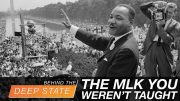Baltimore’s new mayor, Bernard C. “Jack” Young, is hoping that if city youths start floating like a butterfly and stinging like a bee, they won’t kill like a psycho. It’s just one proposal, albeit an unorthodox one, Young suggested to remedy the city’s high murder rate.
Unfortunately, a more orthodox proposal, suggested by a pastor and which would address the deeper issues — a return to faith — is not something the mayor could propose without risking a political knockout.
As CBS Austin reports:
Attending a community rally against gun violence Sunday, Young said boxing matches at the Civic Center, now the Royal Farms Arena could help people in his community “to put these guns down.”
“If they want to really settle them, we can have them down to the Civic Center, put a boxing ring up let them go and box it out,” the mayor said. “And the best man wins and the beefs will be over. Those are some [of the] kinds of things I’m thinking about, hoping that we can get these people to put these guns down.”
Baltimore has been struggling with a rise in gun violence and violent crime in recent years. There have already been more than 123 people killed to gun violence and more than 275 non-fatal shootings in Baltimore since the start of 2019.
Young also suggested “mediation” as a possible way to transform his urban homicide hell.
As to the aforementioned rally, “The mayor, Baltimore State’s Attorney Marilyn Mosby and City Councilman Robert Stokes Sr. joined hundreds of people from Walk By Faith Ministries, which held its Sunday worship outside, in the parking lot at Parkside Shopping Center, to kick off the ‘Bmore United’ rally against gun violence, sponsored by the city,” writes the Baltimore Sun.
“The rally served as a prelude to National Gun Violence Awareness Day on June 7 and a series of weekend ‘pop-up’ youth engagement events by the state’s attorney’s office on Fridays this summer,” the paper continues.
“Gun violence” (as opposed to people committing violence with guns) is interesting phraseology. Note that guns didn’t commit nearly as much violence in the ’40s and ’50s, when gun-control laws were fewer and boys actually carried rifles on the NYC subways because they belonged to school shooting clubs. What has happened with these guns?
Nothing, really. But a lot has changed about their users. More on that momentarily.
Mayor Young’s boxing idea actually is neither crazy nor unprecedented. Men had often devised what we can call “gentleman’s” codes governing combat to ensure that disputes could be settled while minimizing bloodshed. That said, this idea, “mediation,” and other such “solutions” are peripheral; they don’t address the matter’s heart.
But Damon Dorsey, Walk By Faith’s pastor, did. Addressing what “happened to our city,” he “said the question reminded him of his elder family members, who could sleep with their doors unlocked,” the Baltimore Sun also reported. “He lamented the removal of prayer from schools and many homes in the U.S., and urged the adults to pray for their children when they send them off to school each day.”
“‘What we’re missing is the faith our ancestors had,’ he said. ‘They had some great faith back then,’” the Sun also tells us.
Speaking of ancestors, the Sun further related that State’s Attorney Mosby “quoted Frederick Douglass: ‘It’s easier to build strong children than it is to repair broken men.’” Quite true, but to know how to build strong children it’s helpful to dig a bit deeper into Douglass’ life.
As with virtually all great men of his time, Douglass didn’t rely on profound, sound-bite sayings and simple fixes (boxing, “midnight basketball”) to solve deep, complex problems. Rather, he was a man of great faith and understood well Matthew 6:33’s counsel, “But seek ye first the kingdom of God, and His righteousness; and all these things shall be added unto you.” As he wrote in his last biography, Life and Times of Frederick Douglass:
I was not more than thirteen years old, when in my loneliness and destitution I longed for some one to whom I could go, as to a father and protector.… One thing I did know well: I was wretched and had no means of making myself otherwise. I consulted a good old colored man named Charles Lawson, and in tones of holy affection he told me to pray, and to “cast all my care upon God.” This I sought to do; and though for weeks I was a poor, broken-hearted mourner, traveling through doubts and fears, I finally found my burden lightened, and my heart relieved. I loved all mankind, slaveholders not excepted, though I abhorred slavery more than ever. I saw the world in a new light, and my great concern was to have everybody converted.
Today we have a bad habit of holding up role models, but then ignoring (and often being completely ignorant of) what made them role models. We purge God and then wonder why children are ungodly; we scoff at Truth and glom onto relativism and then ask why kids live lies and behave as if everything is relative to their own egos. We subtly, and sometimes not so subtly, send the message that we’re just material beings — chemicals-and-water organic robots — and then are shocked when youths have no respect for life. We instill the belief that this existence is all there is and that there’s no inherent meaning to it, and then wonder why people descend into hedonism and subordinate everything to their own pleasures and desires.
We also tell ourselves that we mustn’t have “religion” in government, reflexively dismissing the idea with “Whose religion?” Yet when extolling the virtues of our government of secularism, we never think to ask, “Whose secularism?”
We just as thoughtlessly exclaim, “The separation of church and state!” even though the principle is not in the Constitution (okay, in fairness, it is in the 1936 Soviet constitution). Moreover, Jefferson’s “wall of separation” was merely a barrier between the central government and the states that allowed the latter to determine their own religious path unfettered by federal meddling.
Lastly, the larger notion of “separation” is meant to avoid tragedies such as the medieval “Investiture Controversy.” The idea is to keep government out of church affairs — not religion out of government.
The even larger issue is that if we purge God at every turn and from our kids’ hearts and minds, should we be surprised when the Devil reigns there instead?
Image: PongsakornJun via iStock / Getty Images Plus




